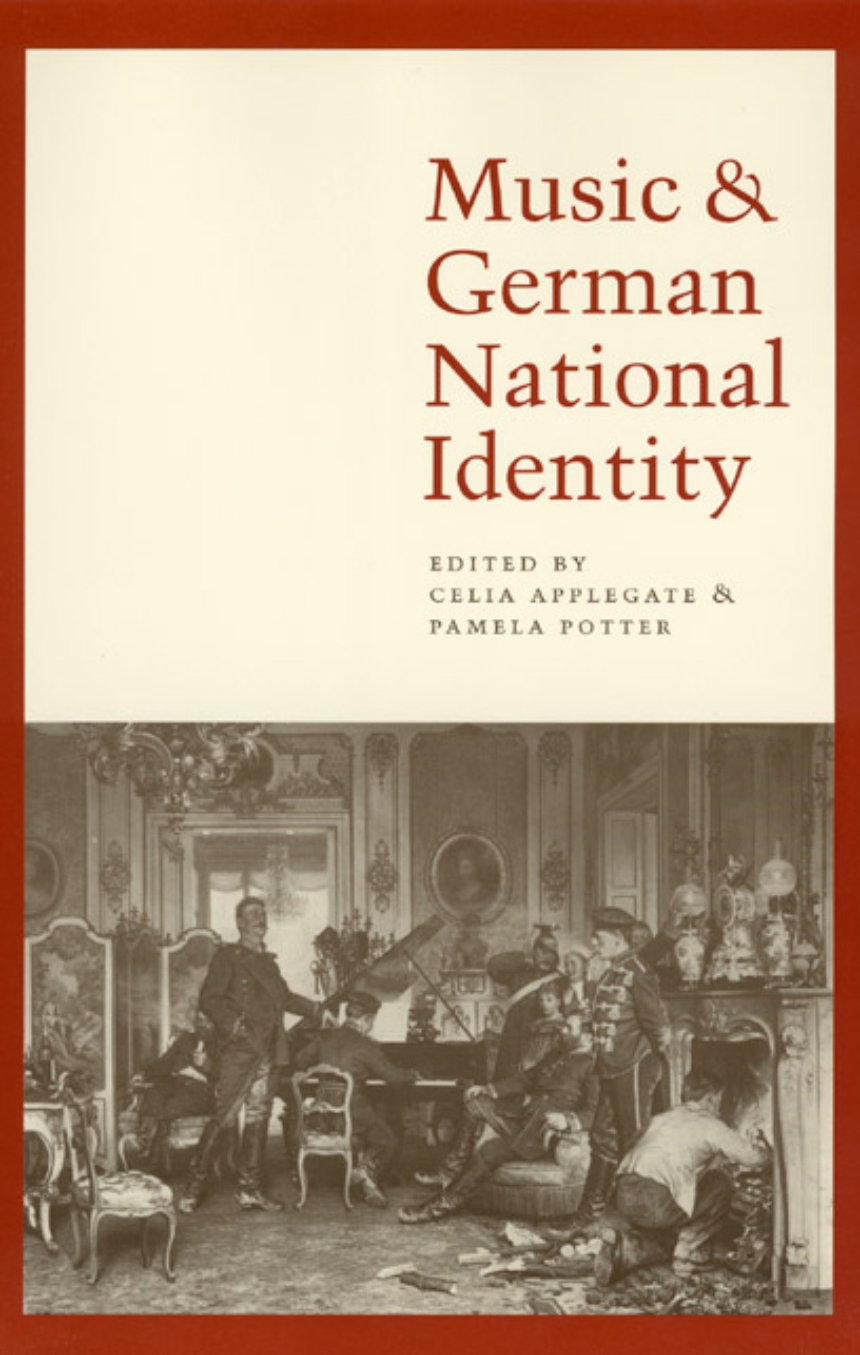Music and German National Identity
Is it merely a coincidence that the three "Bs" of classical music—Bach, Beethoven, Brahms—are all German composers? Why do concert halls all over the world feature mostly the works of German and Austrian composers as their standard repertoire? Over the past three centuries, supporters of German music ranging from music scholars to politicians have nurtured the notion that the German-speaking world possesses a peculiar strength in the cultivation of music.
This book explores the questions of how music came to be associated with German identity, when and how Germans came to be regarded as the "people of music," and how music came to be designated as "the most German art." Drawing on the expertise of leading scholars in German history, musicology, and German literature, the essays assembled here examine philosophy, literature, politics, and social currents, as well as the creation and performance of folk music, art music, church music, jazz, and pop to explore the ways in which music has continued to play a central role in the German national imagination and in shaping German identity.
This book explores the questions of how music came to be associated with German identity, when and how Germans came to be regarded as the "people of music," and how music came to be designated as "the most German art." Drawing on the expertise of leading scholars in German history, musicology, and German literature, the essays assembled here examine philosophy, literature, politics, and social currents, as well as the creation and performance of folk music, art music, church music, jazz, and pop to explore the ways in which music has continued to play a central role in the German national imagination and in shaping German identity.
329 pages | 7 line drawings, 1 table | 6 x 9 | © 2002
History: European History
Music: General Music
Table of Contents
Contents
Acknowledgments
List of Abbreviations
Germans as the "People of Music": Genealogy of an Identity
Celia Applegate and Pamela Potter
Reconstructing Ideal Types of the "German" in Music
Bernd Sponheuer
Einheit—Freiheit—Vaterland: Intimations of Utopia in Robert Schumann’s Late Choral Music
John Daverio
Wagner’s Die Meistersinger as National Opera (18681945)
Thomas S. Grey
Landscape—Region—Nation—Reich: German Folk Song in the Nexus of National Identity
Philip V. Bohlman
Kein schöner Land: The Spielschar Ekkehard and the Struggle to Define German National Identity in the Weimar Republic
Bruce Campbell
Hosanna or "Hilf, O Herr Uns": National Identity, the German Christian Movement, and the "Dejudaization" of Sacred Music in the Third Reich
Doris L. Bergen
National and Universal: Thomas Mann and the Paradox of "German" Music
Hans Rudolf Vaget
Culture, Society, and Politics in the Cosmos of "Hans Pfitzner the German"
Michael H. Kater
"Für eine neue deutsche Nationaloper": Opera in the Discourses of Unification and Legitimation in the German Democratic Republic
Joy Haslam Calico
Darmstadt, Postwar Experimentation, and the West German Search for a New Musical Identity
Gesa Kordes
American Jazz in the German Cold War
Uta G. Poiger
Postwar German Popular Music: Americanization, the Cold War, and the Post-Nazi Heimat
Edward Larkey
On the History of the "Deutschlandlied"
Jost Hermand
Ethnicity and Musical Identity in the Czech Lands: A Group of Vignettes
Bruno Nettl
"Is That Not Something for Simplissimus?!" The Belief in Musical Superiority
Albrecht Riethmüller
List of Contributors
Index
Acknowledgments
List of Abbreviations
Germans as the "People of Music": Genealogy of an Identity
Celia Applegate and Pamela Potter
Reconstructing Ideal Types of the "German" in Music
Bernd Sponheuer
Einheit—Freiheit—Vaterland: Intimations of Utopia in Robert Schumann’s Late Choral Music
John Daverio
Wagner’s Die Meistersinger as National Opera (18681945)
Thomas S. Grey
Landscape—Region—Nation—Reich: German Folk Song in the Nexus of National Identity
Philip V. Bohlman
Kein schöner Land: The Spielschar Ekkehard and the Struggle to Define German National Identity in the Weimar Republic
Bruce Campbell
Hosanna or "Hilf, O Herr Uns": National Identity, the German Christian Movement, and the "Dejudaization" of Sacred Music in the Third Reich
Doris L. Bergen
National and Universal: Thomas Mann and the Paradox of "German" Music
Hans Rudolf Vaget
Culture, Society, and Politics in the Cosmos of "Hans Pfitzner the German"
Michael H. Kater
"Für eine neue deutsche Nationaloper": Opera in the Discourses of Unification and Legitimation in the German Democratic Republic
Joy Haslam Calico
Darmstadt, Postwar Experimentation, and the West German Search for a New Musical Identity
Gesa Kordes
American Jazz in the German Cold War
Uta G. Poiger
Postwar German Popular Music: Americanization, the Cold War, and the Post-Nazi Heimat
Edward Larkey
On the History of the "Deutschlandlied"
Jost Hermand
Ethnicity and Musical Identity in the Czech Lands: A Group of Vignettes
Bruno Nettl
"Is That Not Something for Simplissimus?!" The Belief in Musical Superiority
Albrecht Riethmüller
List of Contributors
Index
